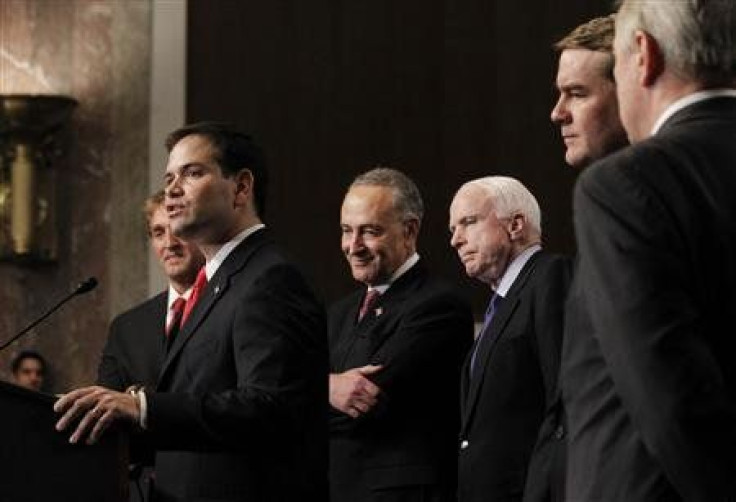
With Vice President Joe Biden presiding over the session, the Senate Gang of Eight immigration reform bill passed the Senate with 68 votes on Thursday afternoon. The tally of supporters was close to the goal of 70 which leading Democrats Chuck Schumer (D-N.Y.) and Majority Leader Harry Reid (D-Nev.) had set in order to generate momentum for the bill as it passed to the House of Representatives.
The bill would make many of the nation's estimated 11 million undocumented immigrants eligible to apply for provisional legal status and put them on a 10-year path to permanent residency and a 13-year path to citizenship. Undocumented immigrants could be eligible six months after the bill passes as long as they got to the US before December 31, 2011, have not committed a felony or more than two misdemeanors and pay a $500 fine.
The Department of Homeland Security must also implement, within 10 years, a flood of border surveillance and law enforcement measures which would double the number of Border Patrol agents along the US-Mexico border to nearly 40,000, build an extra 350 miles of "pedestrian fencing" to frustrate would-be crossers, and install $3.2 billion worth of surveillance and detection technologies. Additionally, the DHS must implement within that span of time an electronic work verification system and another electronic system to track people leaving the nation's airports and seaports. The border must be under 100 percent surveillance, with 90 percent of would-be crossers caught or turned back within that time frame.
But House Speaker John Boehner (R-Ohio) said again on Thursday that he would not introduce the bill or any other piece of legislation on the House floor unless it had the majority of his caucus' support - an informal custom known as the "Hastert rule". Instead, the House will push its own legislation in the form of small, piecemeal bills.
"The House is not going to take up and vote on whatever the Senate passes," he said. "We're going to do our own bill, through regular order, and it'll be legislation that reflects the will of our majority and the will of the American people. For any legislation - including a conference report - to pass the House, it's going to have to be a bill that has the support of a majority of our members."
So far the House has crafted four of its own immigration-related bills: the Strengthen and Fortify Enforcement Act, which would give states power to create and enforce their own immigration laws, keep federal authorities from setting law enforcement priorities and even allow local cops to carry out immigration-related operations; the Legal Workforce Act, which mandates that all employers implement E-Verify, an electronic work eligibility system, within two years; the Agricultural Guestworker Act, which creates a new guest worker program for farmers in need of foreign labor but does not address worker protections and rights; and the SKILLS Act, which creates hundreds of thousands more visas for high-skilled workers in the fields of science, technology, engineering and math.
© 2024 Latin Times. All rights reserved. Do not reproduce without permission.